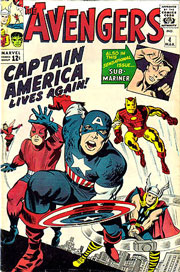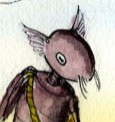
This week, Tim talks with two women who are mixing Japanese and Western influences in their comics!
First, Ana Moreno, former US Marine and writer of Marine Corps Yumi, drawn in a gag-manga style by Takeshi Nogami. A gag manga about joining the Marines?! (available in both English and Japanese)
Then, Aussie Madeleine Rosca, creator of Hollow Fields (reviewed on last week’s show). Why does her work read right to left? Does she get any guff from readers about imitating a Japanese style? Also, the art of revealing neither too many nor too few secrets as your story moves forward, and more.
Podcast: Play in new window | Download


 Tim talks with the members of
Tim talks with the members of  Having grown up with feet planted firmly on both sides of the Pacific,
Having grown up with feet planted firmly on both sides of the Pacific, 
 While the phrase “’90s comics” tends to elicit some eyerolls nowadays — Foil covers! X-men with huge guns and lots of pouches! — there was still some good comics work done in that era. What was it like to be in the business back then? Joe St.Pierre drew some Spider-man Clone Saga-related comics, so let’s ask him!
While the phrase “’90s comics” tends to elicit some eyerolls nowadays — Foil covers! X-men with huge guns and lots of pouches! — there was still some good comics work done in that era. What was it like to be in the business back then? Joe St.Pierre drew some Spider-man Clone Saga-related comics, so let’s ask him!  There are numerous ways in which you may have encountered
There are numerous ways in which you may have encountered 



 Tim Across America, part nine! When it comes to Big Two comics these days, there’s a lot to complain about. Marvel characters changed to look like the actors who play them in movies; nearly the entire DC line subsumed into a grim-and-gritty muck. And yet… we still like some of these books! Superior Spider-man, anyone?
Tim Across America, part nine! When it comes to Big Two comics these days, there’s a lot to complain about. Marvel characters changed to look like the actors who play them in movies; nearly the entire DC line subsumed into a grim-and-gritty muck. And yet… we still like some of these books! Superior Spider-man, anyone? Tim Across America, part 7! Gordon McAlpin has put in more than a decade on the popular Web comic
Tim Across America, part 7! Gordon McAlpin has put in more than a decade on the popular Web comic